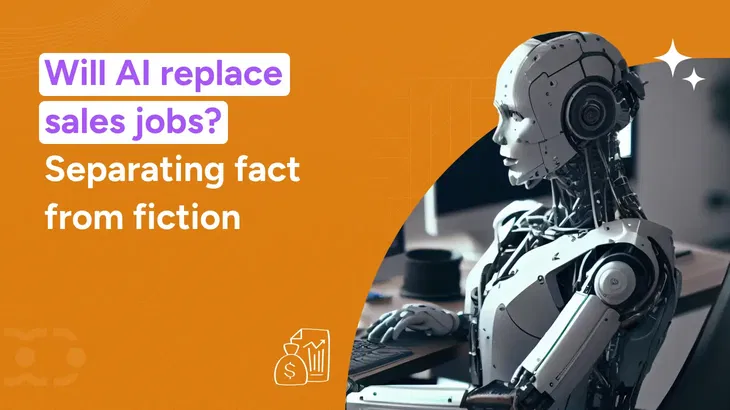You might love how ChatGPT gives you quick answers.
But would you trust his response to negotiate a million-dollar deal?
Probably not, as it demands human-to-human connection.
AI is shaking up sales, no doubt.
But does it mean sales jobs are disappearing?
If the constant buzz around "Will AI replace sales jobs?" concerns you, let's cut through the noise and focus on what's actually happening.
AI vs. sales reps: Myths and facts
AI in sales is evolving fast, but so are the misconceptions around it. And misinformation often leads to fear, and fear leads to missed opportunities.
Let's separate fact from fiction and uncover how AI is really changing sales:
Myth 1: AI will replace all sales jobs
AI is not taking over sales jobs; it's changing them.
While AI automates tasks like data analysis and lead qualification, human judgment, creativity, and emotional intelligence remain irreplaceable.
According to CNN Business, nearly 70% of companies plan to hire AI-skilled workers, while 62% seek employees who can work alongside AI (World Economic Forum, Future of Jobs Report).
Currently, AI in sales is a tool, not a takeover.
Myth 2: AI removes the need for human decision-making
AI can do data analysis faster than any human, but decision-making requires more than just data.
- AI can't build trust or handle sensitive conversations.
- AI learns from past data, which may lead to unfair decisions.
- Buyers prefer human judgment, especially in high-stakes sales.
A study by PwC found that 82% of consumers want more human interaction as technology improves, emphasizing the need for trust and emotional intelligence in sales.
So, we can say:
AI assists, but human intuition, ethics, and relationship-building remain irreplaceable.
Myth 3: AI is only for big enterprises
Think AI is only for billion-dollar corporations?
Think again.
You and I must have known many solopreneurs and one-person business professionals making a living with AI support and smart intelligence.
Myth 4: AI guarantees instant success
Not quite.
83% of companies say AI is a top priority in their business plans, but success depends on how well AI is integrated and used.
Businesses use AI-driven CRM systems and automation to compete at scale, but success can only happen when the execution is on point.
So, leveraging AI sales tools isn't a magic fix. Rather, it's an efficiency booster when used correctly.
Myth 5: AI can work independently without human input
Even companies heavily use AI, such as Amazon's recommendation engine.
Still, the brands rely on human sales and marketing teams to refine strategies, personalize customer interactions, and drive engagement.
AI can suggest product recommendations, automate follow-ups, and analyze buying behaviors.
However, it cannot build trust, handle nuanced negotiations, or create meaningful customer relationships alone.
This means:
Sales success still depends on the human touch.
Now that we've busted these myths. Let's understand how AI changes sales and how you can leverage it to stay ahead.
AI is reshaping sales, not replacing salespeople.
With AI, sales have shifted from a quantity-driven approach to a precision-driven strategy.
Further,
Sales jobs aren't vanishing.
It's evolving with AI as a co-pilot.
On The AI for Sales Podcast, Mike Todasco highlights how AI enhances personalization and efficiency but cannot replace the trust, emotional intelligence, and strategic thinking required in sales.
So, understand that sales as a field are the most evolved and disrupted with AI in the picture, but it is stressing us for the mind-shift:
1. Sales isn't a numbers game anymore - It has become a data game
The traditional sales model was built on brute force:
- Old model: More cold calls, more follow-ups, more pipeline-building.
- New model: Engaging the right prospect at the right time with AI-driven insights.
AI helps sales teams prioritize precision over volume.
Instead of wasting time chasing unqualified leads, reps can use AI-led buying processes, such as predictive lead scoring, to prioritize opportunities dynamically based on real-time buyer signals.
2. Artificial intelligence (AI) - A tool, not a replacement
Despite rapid advancements, AI has clear limitations in sales interactions:
- Building trust: AI can suggest talking points but cannot create authentic relationships.
- Handling objections: AI can provide data-driven rebuttals but cannot read emotional undertones.
- Negotiation: AI can optimize pricing but cannot understand nuanced motivations.
AI is an assistant, not a deal-closer. The best sales reps will be those who can blend AI-powered efficiency with human-driven connections to build strong customer relationships.
Will AI take over sales jobs - A breakdown of what AI can and can't do in sales
AI is no longer a futuristic concept.
It's here, reshaping industries, streamlining processes, and making sales teams rethink their strategies.
AI can now more efficiently handle filtering and scheduling job tasks such as manual prospecting, lead qualification, and even initial outreach than a human working without customer data.
The truth is that AI is transforming sales, but it is not replacing the human touch that drives successful deals.
Some sales roles may evolve or even disappear, but others will become more valuable than ever.
So, where does AI excel, and where do humans remain irreplaceable?
Let's break it down.
What can AI do in sales to replace human reps?
AI thrives in data-driven, repetitive tasks, making sales teams more efficient.
Here's where AI is making the biggest impact:
1. Automating lead qualification and outreach
A Salesforce study found that 98% of AI-driven sales teams report improved lead prioritization.
AI-powered predictive lead scoring replaces the manual effort of sorting through prospects.
AI tools analyze CRM (Customer Relationship Management) data, engagement history, and customer behavior to rank leads by their likelihood of conversion.
Wait, don't get just convinced; here's a twist:
Where AI wins here: AI can instantly analyze massive data sets, prioritizing leads faster and more accurately than a human manually sorting contacts.
Where AI falls short: AI can't read between the lines or detect subtle buyer hesitations that a skilled salesperson would catch.
Don't miss out on: 14 Top AI CRM use cases where intelligence meets CRM!
2. Automating emails, follow-ups, and chat responses
AI-powered chatbots can now manage up to 80% of routine customer inquiries.
AI-powered CRM assistants book meetings and respond to inquiries with minimal human involvement.
Salesmate Sandy AI brings new efficiency to sales communication by precisely handling emails, follow-ups, and chat responses.
It is a tool that understands the context of every conversation, schedules meetings, drafts responses, and keeps prospects engaged without constant manual effort.
With powerful automation, sales reps no longer need to chase leads or spend hours crafting emails.
Sandy AI ensures timely follow-ups, responds to inquiries instantly, and streamlines outreach so sales teams can focus on their strengths: building relationships and closing deals.
However, many sales coaches state facts:
AI might assist you in timely follow-ups, but if you are to deal with high-net clients, AI lacks persuasion.
For such a scenario, only human sales reps with skills like storytelling and emotional intelligence move prospects from interest to action.
3. Enhancing forecasting and sales insights
McKinsey reports that AI cuts forecasting errors by 50% and reduces lost sales by 65% through improved product availability.
AI is much smarter at analyzing past performance, market trends, and real-time sales activities to generate highly accurate sales predictions because it scans loads of data in a blink.
While AI improves sales forecasting, it still requires human oversight to account for unexpected market shifts and buyer behavior.
Insightful read: 18 Top sales forecasting methods explained – Choose the right one!
4. Hyper-personalizing sales at scale
AI doesn't just automate outreach.
It makes it hyper-personalized by analyzing customer behavior, past interactions, and engagement history.
According to a Statista report, 47% of business leaders consider data accuracy the most important factor in measuring the effectiveness of AI-driven personalization.
Additionally, 44% prioritize real-time data speed and customer retention, while 42% see time savings as a key success indicator.
Where AI wins: AI dynamically adjusts messaging based on real-time customer data and past interactions.
Where AI falls short: AI lacks the human intuition needed to adapt in real-time during high-stakes conversations.
Now that you understand the parts of the sales process where AI is majorly contributing, you can expect it to replace the entire job.
What AI lacks that makes human sales professionals irreplaceable
While AI is making sales teams faster, smarter, and more efficient, there are critical aspects where human reps remain indispensable.
1. Building trust and emotional connections
Would you rely on AI to calm an angry customer, understand their frustration, and turn the conversation around?
Probably not.
The reason:
True empathy and trust come from human connection, not algorithms.
And we have proof of numbers to it:
- 70% of consumers are more likely to purchase a product when an advertisement evokes an emotional response.
- 71% of customers recommend a brand because they feel a strong emotional connection to it.
- Emotional marketing campaigns have a 31% higher success rate than non-emotional campaigns.
2. Handling complex negotiations and objections
AI can suggest responses but can't pivot a conversation when an unexpected objection arises.
Humans think beyond the numbers; great sales reps craft win-win solutions tailored to each deal.
Interesting read: Price is too high: How to overcome price objections in sales
3. Understanding unspoken buyer motivations
AI analyzes behaviors, but only humans can interpret intent and emotions.
Humans connect on a personal level, turning one-time buyers into long-term relationships. AI operates on data and logic, but buying decisions are rarely based on logic alone.
Customers buy based on emotions, company culture, personal goals, and hidden needs, which are things that AI struggles to interpret.
4. Creative problem-solving and strategic thinking
AI is great at recognizing patterns and automating responses, but AI doesn't innovate.
It's the humans who developed AI.
Sales professionals are problem-solvers, adjusting strategies on the fly and crafting custom solutions based on real-time interactions.
So, who are those salespeople who should be worried?
If you're still selling like it's 2015, you're already behind.
Sales have evolved, yet many reps are clinging to outdated methods:
- Cold calling without research, hoping to get lucky.
- Mass email blasts with zero personalization.
- Relying on gut instinct instead of leveraging data.
AI is already doing these tasks better, faster, and at scale.
AI will take over if your role revolves around low-value, repetitive activities.
But if you know how to use AI to enhance your work, you'll keep your job and outperform those who don't.
So, instead of fearing AI, the real question is: Are you adapting fast enough?
No debate.
AI is a powerful tool.
But AI can't replace the uniquely human elements that drive sales success.
To future-proof your career, focus on mastering these high-value skills.
The skills that will future-proof your sales career
Bring that mindset in this era:
The best sales reps don't compete against AI; they learn how to co-work with it.
And for that, you need to be AI skillful:
- AI literacy: AI is a force multiplier, not a replacement. Sales reps who know how to automate tasks, personalize outreach, and analyze AI-driven insights will sell more in less time.
- Critical thinking: AI provides recommendations, but only humans can interpret, challenge, and refine them. Strategic thinking remains a human advantage.
- Emotional intelligence: Sales is about trust. AI can analyze sentiment but can't build relationships or navigate complex negotiations.
- Storytelling: AI can draft emails, but only skilled sales reps can make them engaging, persuasive, and authentic.
- Data-driven selling: AI helps prioritize leads and personalize outreach, but sales reps must know how to apply insights effectively.
Insightful read: Storytelling in marketing [End-to-end guide]
Sales leaders: Adapt or fall behind
Sales leaders must integrate it strategically by focusing on training, hiring, and performance metrics.
- AI training for sales teams: Sales reps trained in AI selling to become more efficient and productive.
- Hiring AI-savvy sales pros: Look for reps comfortable with AI-powered sales tools and data-driven decision-making.
- Updating KPIs: Measure success by AI-assisted engagement, pipeline efficiency, and personalized outreach performance.
Sales teams that embrace AI strategically will outperform those who resist change.
Conclusion: Sales are evolving, are you?
AI isn't replacing sales jobs.
It's replacing outdated sales methods and can replace lazy salespeople.
However, sales reps who learn to use AI effectively outperform those who resist change.
"The future of sales doesn't belong to AI. It belongs to the salespeople who know how to use AI better than anyone else."
Fuel business revenue with Salesmate!
Boost sales, automate workflows, and build lasting relationships—all from one platform.
Frequently asked questions
1. Will AI replace sales jobs entirely?
No. AI can handle repetitive tasks like lead qualification and CRM updates but can't build trust, negotiate, or make strategic decisions. Sales roles will evolve, not disappear.
2. What types of sales roles are most at risk due to AI?
Roles that rely on manual prospecting, cold outreach, and repetitive admin work are most vulnerable. Sales reps who fail to integrate AI into their workflow will struggle. Those who adapt will have a competitive edge.
3. How is AI changing the sales process?
AI is making sales more data-driven and personalized by:
- Automating time-consuming tasks so sales reps can focus on closing.
- Using predictive analytics to identify high-value leads.
- Helping reps send smarter, more relevant outreach at the right time.
4. Will sales jobs be automated?
AI can take over time-consuming tasks of sales jobs like:
- Lead scoring and qualification
- Follow-up emails and responses
- Scheduling meetings and reminders
- CRM data updates and organization
- Personalized product recommendations
5. What is an AI salesperson?
You can call an AI automated system an AI salesperson that assists in sales tasks such as responding to customer inquiries, generating leads, and recommending products.







Key takeaways
You might love how ChatGPT gives you quick answers.
But would you trust his response to negotiate a million-dollar deal?
Probably not, as it demands human-to-human connection.
AI is shaking up sales, no doubt.
But does it mean sales jobs are disappearing?
If the constant buzz around "Will AI replace sales jobs?" concerns you, let's cut through the noise and focus on what's actually happening.
AI vs. sales reps: Myths and facts
AI in sales is evolving fast, but so are the misconceptions around it. And misinformation often leads to fear, and fear leads to missed opportunities.
Let's separate fact from fiction and uncover how AI is really changing sales:
Myth 1: AI will replace all sales jobs
AI is not taking over sales jobs; it's changing them.
While AI automates tasks like data analysis and lead qualification, human judgment, creativity, and emotional intelligence remain irreplaceable.
According to CNN Business, nearly 70% of companies plan to hire AI-skilled workers, while 62% seek employees who can work alongside AI (World Economic Forum, Future of Jobs Report).
Currently, AI in sales is a tool, not a takeover.
Myth 2: AI removes the need for human decision-making
AI can do data analysis faster than any human, but decision-making requires more than just data.
A study by PwC found that 82% of consumers want more human interaction as technology improves, emphasizing the need for trust and emotional intelligence in sales.
So, we can say:
AI assists, but human intuition, ethics, and relationship-building remain irreplaceable.
Myth 3: AI is only for big enterprises
Think AI is only for billion-dollar corporations?
Think again.
You and I must have known many solopreneurs and one-person business professionals making a living with AI support and smart intelligence.
Myth 4: AI guarantees instant success
Not quite.
83% of companies say AI is a top priority in their business plans, but success depends on how well AI is integrated and used.
Businesses use AI-driven CRM systems and automation to compete at scale, but success can only happen when the execution is on point.
So, leveraging AI sales tools isn't a magic fix. Rather, it's an efficiency booster when used correctly.
Myth 5: AI can work independently without human input
Even companies heavily use AI, such as Amazon's recommendation engine.
Still, the brands rely on human sales and marketing teams to refine strategies, personalize customer interactions, and drive engagement.
AI can suggest product recommendations, automate follow-ups, and analyze buying behaviors.
However, it cannot build trust, handle nuanced negotiations, or create meaningful customer relationships alone.
This means:
Sales success still depends on the human touch.
Now that we've busted these myths. Let's understand how AI changes sales and how you can leverage it to stay ahead.
AI is reshaping sales, not replacing salespeople.
With AI, sales have shifted from a quantity-driven approach to a precision-driven strategy.
Further,
Sales jobs aren't vanishing.
It's evolving with AI as a co-pilot.
On The AI for Sales Podcast, Mike Todasco highlights how AI enhances personalization and efficiency but cannot replace the trust, emotional intelligence, and strategic thinking required in sales.
So, understand that sales as a field are the most evolved and disrupted with AI in the picture, but it is stressing us for the mind-shift:
1. Sales isn't a numbers game anymore - It has become a data game
The traditional sales model was built on brute force:
AI helps sales teams prioritize precision over volume.
Instead of wasting time chasing unqualified leads, reps can use AI-led buying processes, such as predictive lead scoring, to prioritize opportunities dynamically based on real-time buyer signals.
2. Artificial intelligence (AI) - A tool, not a replacement
Despite rapid advancements, AI has clear limitations in sales interactions:
AI is an assistant, not a deal-closer. The best sales reps will be those who can blend AI-powered efficiency with human-driven connections to build strong customer relationships.
Will AI take over sales jobs - A breakdown of what AI can and can't do in sales
AI is no longer a futuristic concept.
It's here, reshaping industries, streamlining processes, and making sales teams rethink their strategies.
AI can now more efficiently handle filtering and scheduling job tasks such as manual prospecting, lead qualification, and even initial outreach than a human working without customer data.
The truth is that AI is transforming sales, but it is not replacing the human touch that drives successful deals.
Some sales roles may evolve or even disappear, but others will become more valuable than ever.
So, where does AI excel, and where do humans remain irreplaceable?
Let's break it down.
What can AI do in sales to replace human reps?
AI thrives in data-driven, repetitive tasks, making sales teams more efficient.
Here's where AI is making the biggest impact:
1. Automating lead qualification and outreach
A Salesforce study found that 98% of AI-driven sales teams report improved lead prioritization.
AI-powered predictive lead scoring replaces the manual effort of sorting through prospects.
AI tools analyze CRM (Customer Relationship Management) data, engagement history, and customer behavior to rank leads by their likelihood of conversion.
Wait, don't get just convinced; here's a twist:
Where AI wins here: AI can instantly analyze massive data sets, prioritizing leads faster and more accurately than a human manually sorting contacts.
Where AI falls short: AI can't read between the lines or detect subtle buyer hesitations that a skilled salesperson would catch.
2. Automating emails, follow-ups, and chat responses
AI-powered chatbots can now manage up to 80% of routine customer inquiries.
AI-powered CRM assistants book meetings and respond to inquiries with minimal human involvement.
Salesmate Sandy AI brings new efficiency to sales communication by precisely handling emails, follow-ups, and chat responses.
It is a tool that understands the context of every conversation, schedules meetings, drafts responses, and keeps prospects engaged without constant manual effort.
With powerful automation, sales reps no longer need to chase leads or spend hours crafting emails.
Sandy AI ensures timely follow-ups, responds to inquiries instantly, and streamlines outreach so sales teams can focus on their strengths: building relationships and closing deals.
However, many sales coaches state facts:
AI might assist you in timely follow-ups, but if you are to deal with high-net clients, AI lacks persuasion.
For such a scenario, only human sales reps with skills like storytelling and emotional intelligence move prospects from interest to action.
3. Enhancing forecasting and sales insights
McKinsey reports that AI cuts forecasting errors by 50% and reduces lost sales by 65% through improved product availability.
AI is much smarter at analyzing past performance, market trends, and real-time sales activities to generate highly accurate sales predictions because it scans loads of data in a blink.
While AI improves sales forecasting, it still requires human oversight to account for unexpected market shifts and buyer behavior.
4. Hyper-personalizing sales at scale
AI doesn't just automate outreach.
It makes it hyper-personalized by analyzing customer behavior, past interactions, and engagement history.
According to a Statista report, 47% of business leaders consider data accuracy the most important factor in measuring the effectiveness of AI-driven personalization.
Additionally, 44% prioritize real-time data speed and customer retention, while 42% see time savings as a key success indicator.
Where AI wins: AI dynamically adjusts messaging based on real-time customer data and past interactions.
Where AI falls short: AI lacks the human intuition needed to adapt in real-time during high-stakes conversations.
Now that you understand the parts of the sales process where AI is majorly contributing, you can expect it to replace the entire job.
What AI lacks that makes human sales professionals irreplaceable
While AI is making sales teams faster, smarter, and more efficient, there are critical aspects where human reps remain indispensable.
1. Building trust and emotional connections
Would you rely on AI to calm an angry customer, understand their frustration, and turn the conversation around?
Probably not.
The reason:
True empathy and trust come from human connection, not algorithms.
And we have proof of numbers to it:
2. Handling complex negotiations and objections
AI can suggest responses but can't pivot a conversation when an unexpected objection arises.
Humans think beyond the numbers; great sales reps craft win-win solutions tailored to each deal.
3. Understanding unspoken buyer motivations
AI analyzes behaviors, but only humans can interpret intent and emotions.
Humans connect on a personal level, turning one-time buyers into long-term relationships. AI operates on data and logic, but buying decisions are rarely based on logic alone.
Customers buy based on emotions, company culture, personal goals, and hidden needs, which are things that AI struggles to interpret.
4. Creative problem-solving and strategic thinking
AI is great at recognizing patterns and automating responses, but AI doesn't innovate.
It's the humans who developed AI.
Sales professionals are problem-solvers, adjusting strategies on the fly and crafting custom solutions based on real-time interactions.
So, who are those salespeople who should be worried?
If you're still selling like it's 2015, you're already behind.
Sales have evolved, yet many reps are clinging to outdated methods:
AI is already doing these tasks better, faster, and at scale.
AI will take over if your role revolves around low-value, repetitive activities.
But if you know how to use AI to enhance your work, you'll keep your job and outperform those who don't.
So, instead of fearing AI, the real question is: Are you adapting fast enough?
No debate.
AI is a powerful tool.
But AI can't replace the uniquely human elements that drive sales success.
To future-proof your career, focus on mastering these high-value skills.
The skills that will future-proof your sales career
Bring that mindset in this era:
The best sales reps don't compete against AI; they learn how to co-work with it.
And for that, you need to be AI skillful:
Sales leaders: Adapt or fall behind
Sales leaders must integrate it strategically by focusing on training, hiring, and performance metrics.
Sales teams that embrace AI strategically will outperform those who resist change.
Conclusion: Sales are evolving, are you?
AI isn't replacing sales jobs.
It's replacing outdated sales methods and can replace lazy salespeople.
However, sales reps who learn to use AI effectively outperform those who resist change.
"The future of sales doesn't belong to AI. It belongs to the salespeople who know how to use AI better than anyone else."
Fuel business revenue with Salesmate!
Boost sales, automate workflows, and build lasting relationships—all from one platform.
Frequently asked questions
1. Will AI replace sales jobs entirely?
No. AI can handle repetitive tasks like lead qualification and CRM updates but can't build trust, negotiate, or make strategic decisions. Sales roles will evolve, not disappear.
2. What types of sales roles are most at risk due to AI?
Roles that rely on manual prospecting, cold outreach, and repetitive admin work are most vulnerable. Sales reps who fail to integrate AI into their workflow will struggle. Those who adapt will have a competitive edge.
3. How is AI changing the sales process?
AI is making sales more data-driven and personalized by:
4. Will sales jobs be automated?
AI can take over time-consuming tasks of sales jobs like:
5. What is an AI salesperson?
You can call an AI automated system an AI salesperson that assists in sales tasks such as responding to customer inquiries, generating leads, and recommending products.
Sonali Negi
Content WriterSonali is a writer born out of her utmost passion for writing. She is working with a passionate team of content creators at Salesmate. She enjoys learning about new ideas in marketing and sales. She is an optimistic girl and endeavors to bring the best out of every situation. In her free time, she loves to introspect and observe people.